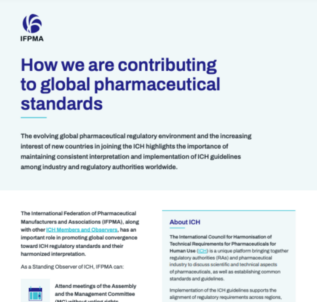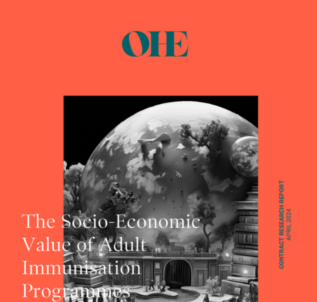WHA 67 agenda item 11.3, Framework of engagement with non-State actors
Delivered by Mario Ottiglio, Director, Public Affairs & Global Health Policy Check against delivery – Item 11.3, Framework of engagement with non-State actors
Thank you for the opportunity to contribute to this important discussion today. IFPMA represents leading research-based pharmaceutical companies as well as national and regional industry associations across the world.
IFPMA welcomes efforts to design a framework allowing WHO to fulfil its leadership role in global health and its mandate by engaging with a varied set of actors.
We want to restate today our firm respect of the supremacy of WHO’s Member States in normative work and the need to design a transparent and comprehensive set of rules that are symmetrically applicable to each actor with no discrimination.
The landscape of global health is complex and collaborative approaches are now integral to much of the work all of us in this room do to address global health challenges.
IFPMA supports efforts to increase transparency and welcomes the practices of risk management and due diligence. However we strongly call for these practices to be designed and enforced equally among all non-state actors, so that everybody’s interest can best serve the only shared objective of making this world a healthier place.
The concept of accountability should be reinforced as a key metric for this organization to assess tangible contributions of non-state actors to achieving WHO’s objectives. Policies and rules should be set having in mind that they need to facilitate health outcomes, not prevent them.
As we stated a few times before WHO’s governing bodies, differentiation should not mean discrimination. We call for the harmonization of rules within single policies so that WHO will be able to maximize its interaction with the global health community. In particular, looking at the document A67/6, we believe that all non-state actors should be bound by the same rules for activities falling into the categories of “resources”, “advocacy”, and “participation to advisory groups”. As well, we would welcome an evaluation of the effectiveness of this framework after a short period of implementation.
To conclude, a robust conflict of interest policy is both appropriate and desirable. We ought not to forget that engagement with actors other than the private sector can lead to conflicts of interest from both the perspective of the WHO as well as the partnering organization.
Thank you.
About IFPMA
The International Federation of Pharmaceutical Manufacturers and Associations (IFPMA) represents over 90 innovative pharmaceutical companies and associations around the world. Our industry’s almost three million employees discover, develop, and deliver medicines and vaccines that advance global health. Based in Geneva, IFPMA has official relations with the United Nations and contributes industry expertise to help the global health community improve the lives of people everywhere. For more information, visit ifpma.org.
Learn more





